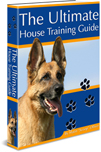Setting out on your journey to learn to how to train a puppy is all about being organized and taking lots of notes. If that sounds a little too simple, don't glaze over and ignore it, as it's a very useful record of what has worked, and will help you identify techniques that work when teaching new tricks. These notes show exactly what works and how your puppy responds to various techniques, and what areas either need more attention or a different approach. It's just the same as "normal life" - planning and preparation are paramount to getting it right rather than failing or getting it wrong. It's just good practice.
Planning ahead is ideally where you need to begin when preparing for train a puppy, as it will make a big difference when relocating a young dog or puppy from his established and comfortable home to the insecure and brand new home you'll be giving him. Puppies can become very stressed and anxious when he is taken away from his mother and siblings, and he is thrust into an entirely new environment with a whole range of new and unknown faces and scents.
And it's not just puppies and young dogs. It happens with older dogs to - they can get depressed by seemingly needless alterations to their living environment. Regardless of their age, your new dog has no idea what awaits in his future; he'll just notice that his friends are gone and he doesn't recognize anything.
If it is at all do-able, an ideal plan would be to visit your puppy or dog at his current home. Doing this will help break the ice between you both and help him get used to you. When you start out, training a puppy he will already be used to you and better able to learn his new skills. If you really can't fit in a few visits, you could ask the old owner for something from the dog's bed, such as a cushion or familiar toy or just something that will remind him of home and survive the feeling of having nothing familiar in his life.
Without doubt, the ideal time to bring home a new dog or puppy is at a time when you're going to be at home for a few days to help him settle in and get to know you. During the holidays is ideal - providing of course you're at home and not on vacation. Please don't move you dog in, then home him in kennels while you go on vacation. You need to have at least a couple of days at home, and help him overcome any separation anxiety he may experience.
When we bring a new baby home, we make heaps of preparations by creating a checklist of things to do and equipment to buy, training a puppy tips should be no different. As a new dog carer, you need to prepare your home in just the same way. After all, your new puppy is a new member of the family.
The perfect place for your new puppy is a cordoned off area in a main living area, as your puppy house training regime will go much smoother as well because any accidents are easier to clean off hard floors. Where possible, in the kitchen makes great puppy real estate as we tend to frequent these areas regularly, which helps to accustom the newcomer to day-to-day living in your household.
In his previous abode, your puppy had the friendship of his littermates. Without them, he will be lonely so you're going to need to give him lots of love and attention to keep his blues away. But equally important - you must not let the puppy do whatever he chooses for the first few days and then suddenly expect him to start following rules that prohibit him from doing exactly those same things. Puppy potty training techniques is something you start from day one - just start with the easy stuff.
Letting him doing his own thing at first is unfair, because it only confuses the puppy. Whatever works when you start training a puppy works in the just the same way when used with adult dogs too. The stress and loneliness of moving can happen to adult dogs too - it's not just a puppy thing. All dogs entering a new living arrangement will need discipline, patience, and comfort. But the rewards are more than worth it.






No comments:
Post a Comment